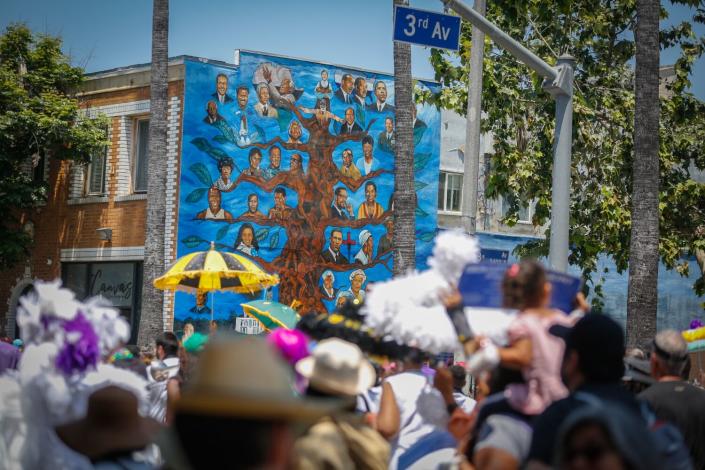
Shortly after the murder of George Floyd and the start of racial reckoning, which has since predictably collapsed, I started collecting T-shirts with pithy sayings about black power. I now have a drawer full of them.
My favorite, by far, is adorned with a pair of dark brown fists sticking out of the handcuffs and the words “Free-ish Since 1865”. It was the year – June 19 or June 19 – that enslaved black people in Galveston, Texas were finally told of their freedom, more than two years after the Emancipation Proclamation was issued.
Wearing this particular t-shirt always reminds us that true freedom is not just about escaping physical bondage. It’s about what happens after that, about not being held captive to a story about you that was made up by someone else.

This is something I suspect many Americans can relate to. Women who bravely tell their stories of rape and violence in a courtroom, for example, only to be branded by cowardly defense attorneys as accomplices to their own assault. Or transgender people and drag queens, whom far-right instigators have conveniently confused and targeted with a groundless fear campaign over gender identity and expression.
Indeed, being free-ish is about as American as apple pie. But for black people, it’s particularly insidious.

Not only are we defined by the often negative narratives of others, but many of us don’t know enough of the truth about ourselves and our collective history to effectively break out of this captivity, even in our own minds.
I was reflecting on all of this on Saturday, as I listened to Los Angeles City Councilwoman Heather Hutt and Mayor Karen Bass take turns behind a microphone to talk about the importance of New Orleans’ new corridor.
About a mile long, it runs along Jefferson Boulevard between the Holy Name of Jesus Catholic Church and the Harold & Belle restaurant in the historically black neighborhood of South Los Angeles.
“People came here and put down roots,” Bass told the hundreds of Angelenos who came to stand in the sun, “and shaped the city of Los Angeles.”

Then a marching band played, and she, Hutt, and New Orleans Mayor LaToya Cantrell joined a slow-paced second-line parade worthy of the French Quarter.
Most of the time, events like this are little more than performative photoshoots. Politicians deliver speeches, cut ribbons, pose and smile as their constituents and a few well-placed stakeholders clap appreciatively and television cameras roll.
But it’s not most of the time.
Over the past three years, dozens of states have introduced bills and passed policies limiting what can be taught in classrooms about race, systemic racism and American history. This has led to inflammatory rhetoric about what too many believe to be critical race theory and the banning of books by a disproportionate number of black authors.
Florida Governor Ron DeSantis, now a Republican presidential candidate, is the most determined to wage this culture war, successfully watering down advanced placement courses on black history. But not to be outdone, Texas Governor Greg Abbott signed a bill last week banning diversity, equity and inclusion offices at public colleges and universities.
These states clearly want black people to remain free.
The New Orleans Corridor in Los Angeles, on the other hand, is synonymous with freedom.

It highlights the story of the millions of black people who moved west beginning in 1883, when the Southern Pacific Railroad completed its transcontinental Sunset route, connecting New Orleans to California. Mass migration has led to LA having the largest Creole community in the country outside of Louisiana.
It’s not a story that’s always taught in schools, especially if you grew up east of the Mississippi River like me.
My family is originally from New Orleans, which I learned just a few years before Hurricane Katrina. But I didn’t learn the city’s connection to California and Los Angeles, in particular, until I moved here in 2018 and started asking questions after noticing a lot of black people who looked like my relatives.
But even among black people who have been Angelenos all their lives, this story is not always known, overlooked, or simply underestimated.
On Saturday, I couldn’t help but admire dozens of older women who looked just like my grandmother, with their slightly ruddy complexions and freckles. Many knew exactly what to do when the first notes from a pair of trombones shot through the air, drowning out the roar of a helicopter overhead. They closed their eyes, waved their towels back and forth, and rocked along Jefferson Boulevard.
But many others shook their heads in astonishment. “I didn’t know it was a thing, the thing between LA and New Orleans” is something I heard over and over again.
Black history is like that. Passed down from generation to generation to a lucky few.
Even Cantrell, the mayor of New Orleans, had a similar story. She grew up in Los Angeles hearing stories from her of how her relatives had migrated using the Sunset Route.

“When I ran for mayor, [people] said, “She’s not from here,” she told me. “But I understand the influence New Orleans has had on Los Angeles. So I see this as a teachable moment for my people in New Orleans, as well as our people here in Los Angeles.”
Knowing where you come from, knowing your history is a powerful truth. It really frees you because it neutralizes the power of other people’s stories.
“We are in a time where there is a massive wipeout,” Hutt warned the hundreds of people who came to his district on Saturday as they nodded and whispered in agreement.
“LA is different in the country,” Bass said. “We’re not trying to erase history. We celebrate it. We recognize our roots.”
This Juneteenth, I’m still free. But I feel a little closer to being free.
This story originally appeared in the Los Angeles Times.

